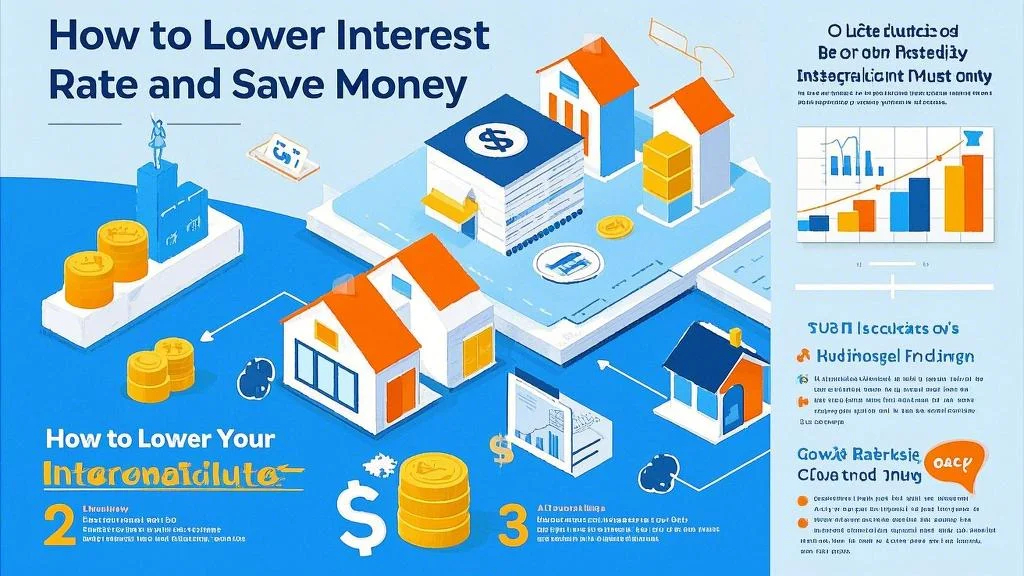Mortgage Refinance: How to Lower Your Interest Rate and Save Money

Why Mortgage Refinance Is a Smart Financial Move
For homeowners, a mortgage refinance can be a powerful tool for lowering your interest rate and saving money over the life of your loan. Refinancing involves replacing your existing mortgage with a new one, often at a lower interest rate, which can reduce your monthly payments and the total amount of interest you pay. In 2025, with interest rates fluctuating, refinancing can be particularly beneficial for those looking to take advantage of lower rates. Additionally, refinancing can provide access to cash through home equity loans, allowing you to fund home improvements, pay off high-interest debt, or cover other expenses. By understanding the benefits and process of refinancing, you can make an informed decision that aligns with your financial goals.
One of the key advantages of a mortgage refinance is its ability to provide immediate financial relief. Lowering your interest rate by even a small percentage can result in significant savings over time. For example, refinancing a $300,000 mortgage from a 5% interest rate to a 4% rate could save you tens of thousands of dollars in interest over the life of the loan. Additionally, refinancing can help you shorten your loan term, allowing you to pay off your mortgage faster and build equity in your home more quickly. However, it’s important to carefully consider the costs associated with refinancing, such as closing costs and fees, to ensure it’s the right move for your financial situation.
How to Qualify for the Best Mortgage Refinance Rates
Securing the best mortgage refinance rates requires careful preparation and a strong financial profile. One of the most important factors lenders consider is your credit score. A higher credit score not only increases your chances of approval but also qualifies you for lower interest rates. To improve your credit score, focus on making timely payments, reducing your credit utilization ratio, and addressing any errors on your credit report. Regularly credit score monitoring can help you track your progress and identify areas for improvement.
Another key factor in qualifying for the best mortgage refinance rates is your debt-to-income (DTI) ratio. Lenders prefer borrowers with a lower DTI, as it indicates a lower risk of default. To improve your DTI, consider paying down existing debt or increasing your income. Additionally, having a stable employment history and a strong financial track record can improve your chances of securing a favorable rate. By taking these steps, you can position yourself as a low-risk borrower and qualify for the best refinance rates available.

Home Equity Loans: Tapping Into Your Home’s Value
For homeowners with significant equity in their property, a home equity loan can be a valuable tool for accessing cash while refinancing your mortgage. Home equity loans allow you to borrow against the equity you’ve built in your home, providing funds for major expenses such as home improvements, education, or debt consolidation. When combined with a mortgage refinance, a home equity loan can help you achieve multiple financial goals at once, such as lowering your interest rate and accessing cash for other needs.
One of the key benefits of a home equity loan is its typically lower interest rate compared to other forms of borrowing, such as credit cards or personal loans. This makes it an attractive option for homeowners looking to consolidate high-interest debt or fund large expenses. Additionally, the interest on a home equity loan may be tax-deductible, providing further financial benefits. However, it’s important to carefully consider the risks, as your home serves as collateral for the loan. By using a home equity loan responsibly, you can leverage your home’s value to achieve your financial goals while maintaining financial stability.
Credit Score Monitoring: A Key to Refinancing Success
For homeowners considering a mortgage refinance, credit score monitoring is a critical tool for achieving success. Your credit score plays a significant role in determining the interest rate and terms you’ll qualify for, so it’s essential to keep a close eye on your credit health. Regularly monitoring your credit score allows you to identify and address any issues that may be affecting your score, such as errors, late payments, or high credit utilization. By taking proactive steps to improve your credit score, you can increase your chances of securing a favorable refinance rate.
One of the key benefits of credit score monitoring is its ability to provide real-time alerts for changes to your credit report. For example, if you notice a sudden drop in your score, you can investigate the cause and take corrective action. Additionally, credit monitoring services often provide access to your credit report and score, allowing you to track your progress over time. By incorporating credit score monitoring into your financial routine, you can stay informed about your credit health and take steps to improve your score, ensuring you’re in the best position to refinance your mortgage.
Why Credit Unions Offer Competitive Refinance Options
When it comes to securing the best mortgage refinance rates, best credit unions are often a top choice for homeowners. Credit unions are member-owned, not-for-profit institutions that typically offer lower interest rates and fees compared to traditional banks. Additionally, credit unions are known for their personalized service and flexible lending criteria, making them a great option for borrowers with less-than-perfect credit. By joining a credit union, you can access competitive refinance rates and terms that may not be available elsewhere.
One of the key advantages of working with a credit union is their commitment to member satisfaction. Credit unions often offer financial education resources, personalized advice, and flexible repayment options to help you achieve your financial goals. Additionally, credit unions may offer special discounts or incentives for members, such as lower rates for automatic payments or loyalty programs. By choosing a credit union for your mortgage refinance, you can secure a low-interest rate and enjoy the benefits of a community-focused financial institution.